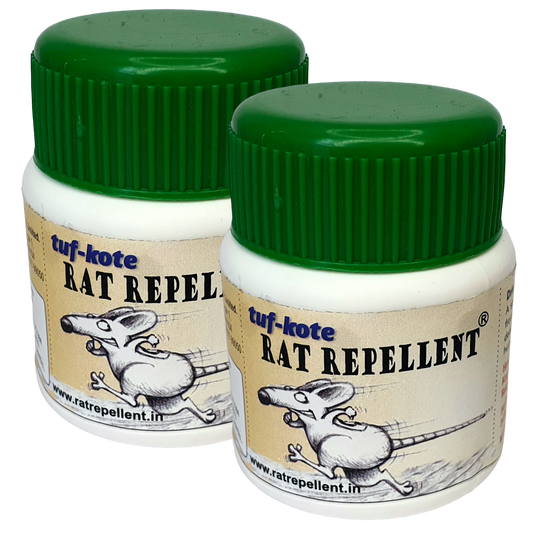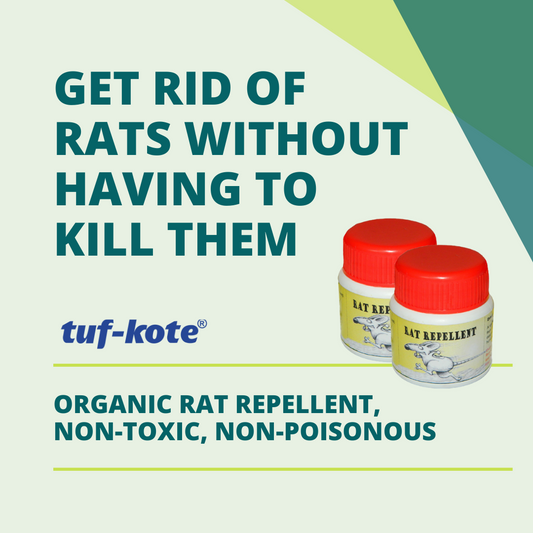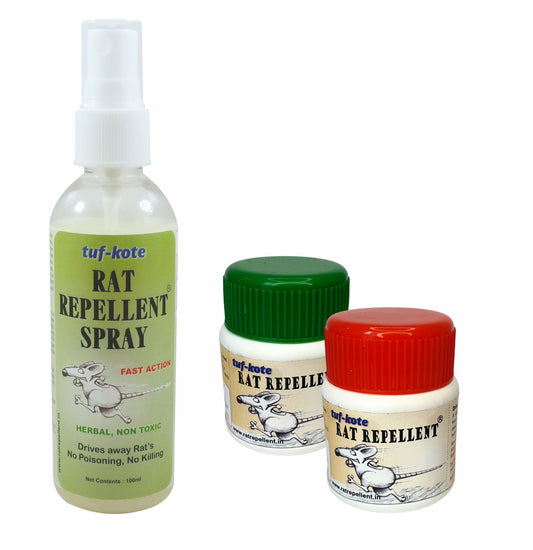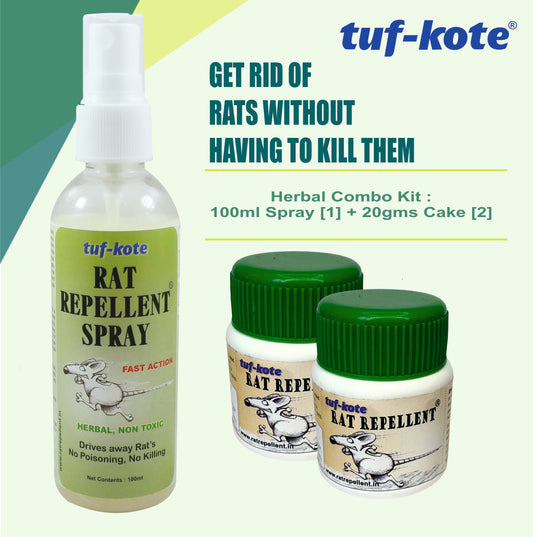-
![tuf-kote® Organic Rat Repellent for Cars, Non-Poisonous, Lasts for upto 90 days, Drive Away Rats Without Killing Them - 20gms [Pack of 2] - tuf-kote®](//tufkote.in/cdn/shop/files/RatRepellentpicture.jpg?v=1684491441&width=533)
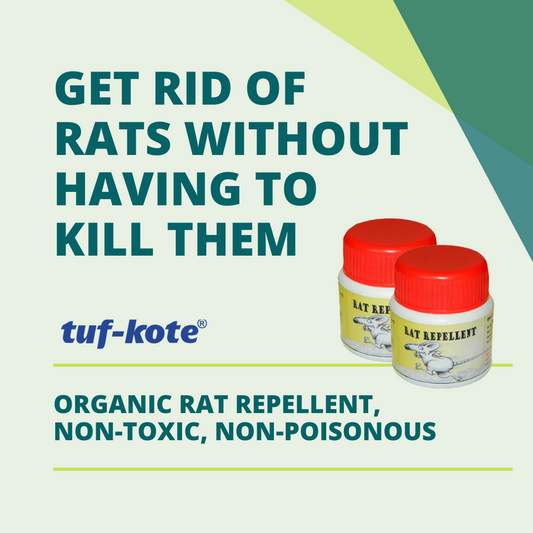
tuf-kote® Organic Rat Repellent, Drive Away Rats Without Killing Them, Non-Poisonous, Non-Toxic
Regular price From Rs. 549.00Regular priceUnit price perRs. 790.00Sale price From Rs. 549.00Sale -
tuf-kote® Herbal Rat Repellent, Non-Poisonous, Lasts for upto 180 days, Drive Away Rats Without Killing Them - 20gms
Regular price From Rs. 579.00Regular priceUnit price perRs. 1,190.00Sale price From Rs. 579.00Sale -
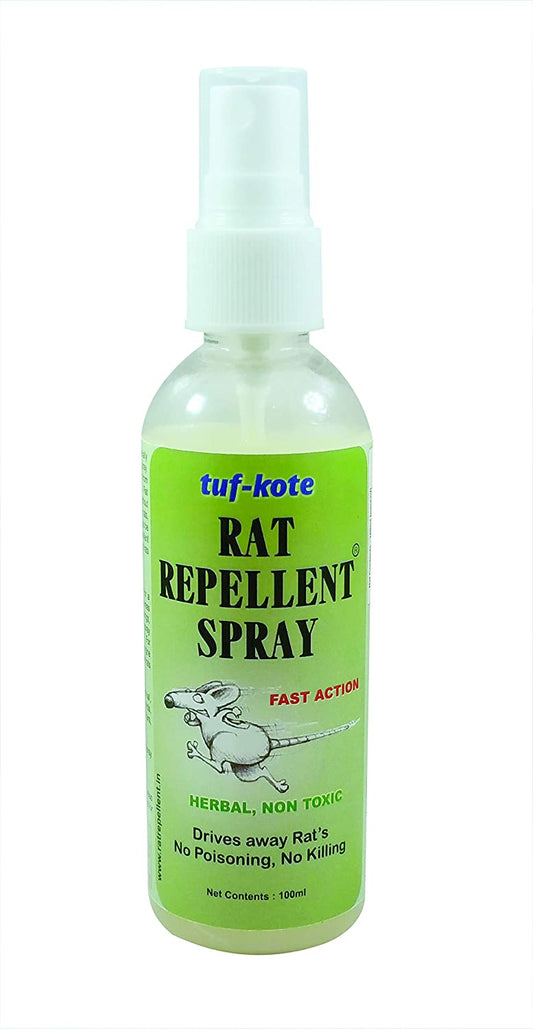
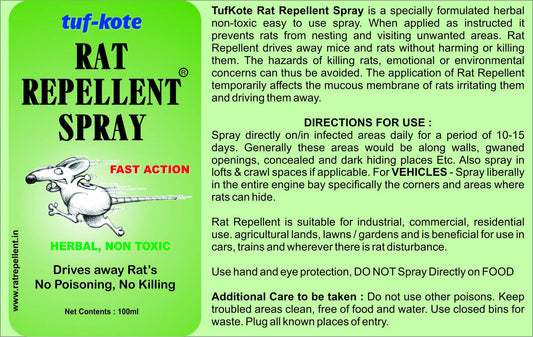
tuf-kote® Herbal Rat Repellent Spray for Car, Home, Godowns, Non-Toxic Non-Poisonous, Fast Action
Regular price From Rs. 349.00Regular priceUnit price perRs. 495.00Sale price From Rs. 349.00Sale -
tuf-kote® Rat Repellent Combo, Non-Poisonous, Drive Away Rats Without Killing Them - Combo Set of 20g x 2 Bottles + 100ml Herbal Spray
Regular price From Rs. 729.00Regular priceUnit price perRs. 1,285.00Sale price From Rs. 729.00Sale -
tuf-kote 250 ML Rat Repellent Spray for Car & Bike | 60 Days Powerful Protection | Peppermint Fragrance + Benzenemethanamine | No Kill Only Repel | Free Mask & Gloves
Regular price From Rs. 199.00Regular priceUnit price perRs. 495.00Sale price From Rs. 199.00Sale
Organic Non-Poisonous, Drive Away Rats Without Killing Them
-
WHY RAT REPELLENT
Rats cause billions in damage to products, machines and homes each year. This is in spite of the use of all the rat repellents, poisons and other pest control methods available. Traps and poisons can be inhumane. They often lead to unnecessary suffering of animals. Poisons are sometimes eaten by the wrong animal. Now you can get rid of rats, mice and rodents by creating a rodent-free zone.
A specially formulated non-poisonous rat repellent, tuf-kote Rat Repellent® drives away rats from your surroundings without the need to kill them. With Rat Repellent, forget the days of removing dead rats after poisoning them. In other words, Rat Repellent does not kill rats as the rodenticides do. The hazards of killing rats, emotional or environmental concerns can thus be avoided
-
tuf-kote Rat Repellent® for cars, garages and factories is better than poison to get rid of rodents. Use our innovative new rat repellent for your vehicles, homes, industrial machinery and storage facilities.
tuf-kote’s Organic Rat Repellents create a rodent-free zone making it ideal for solving the problem. Place the rat repellent in your vehicle / garage, factory or industrial unit.
Rodents are repelled when they go near your car, industrial machinery or storage unit. This gives excellent pest control and makes sure you get rid of rats.
Potentially more effective and safer than poison or traps as pest control.
-
WHY RATS ATTACK?
Rodents don't damage property out of malice; their teeth grow continuously and need to be worn down by chewing hard materials. They grow at a rate of 4 1/2 to 5 1/2 inches a year, so if they aren't worn down it quickly becomes unable to eat. Sometimes when they chew they are looking for food, warmth or shelter. Unfortunately a huge amount of damage is done whilst sharpening their teeth and looking for food and shelter.
-
ARE THEY IN YOUR VEHICLE?
Rodents are everywhere, and they can do considerable damage when they invade your vehicle. They might decide your car is a safe place to make a nest and a handy site to store food. If you can discourage them, you may win the battle.
-
HOW TO FIND OUT IF RODENTS HAVE DAMAGED YOUR CAR
When you have a car, there is a lot of time and effort that goes into the maintenance of your vehicle. You will probably more than likely have your own routine. This will include the likes of checking the oil, making sure the wiper blades aren't damaged, tyre pressure and so on. There could be one thing you are overlooking.
-
BE VIGILANT, ACT FAST
There could be unexplained damage that you shrugged off at first but now is really bugging you. If you have noticed a wire or upholstery that looked nibbled these could be the calling card of your local rodent population. In particular, rats. Droppings are another sign that you might have a problem.
Rodents cause more damage to cars than many people realise and most don't even consider them a problem. The simple fact remains that however secure your vehicle not even the most expensive equipment can keep out a rat.
-
SIGNS OF RODENT DAMAGE
If you notice any chewed wires or upholstery or poop droppings there is a rodent getting into your car. Don't bother scratching your heads either and complaining to your valet service about leaving food remnants in the car. Tiny remnants of food down the back of a seat are enough to catch the super sensitive sense of smell of a rat. As far as the chewed wires are concerned, they haven't mistaken them for food they are using them to sharpen their teeth
-
HIDDEN DAMAGE
While this may be a problem you know little, if anything about, most garages will be used to repairing the damage that rats cause to cars. They will have replaced miles of wiring and tons of insulation that the rat has destroyed over the years. The key is looking for the first signs of damage as the first thing many drivers know of it is when they are hit with a hefty repair bill. Spotting the damage early can save your wallet from a nasty shock..
PREVENTION IS BETTER THAN CURE
-
tuf-kote rat repellent is ideal in this situation. It creates a barrier around your car which can't pass. It is safe and non-toxic, unlike many other solutions which are available on the market. It drives away rats from your surroundings by temporarily affecting the mucous membrane of rats. After long exposure, rats gradually start developing a fear of smelling it and hence stop wandering in the 100 sq. ft. radius of the place where it was kept.
Rats are smart, they will soon sniff out a new food source. In the process they will make use of a warm sheltered environment (such as a car or garage) where they can easily set up home. Be thorough when you are cleaning out the car and make sure you go right down the backs of seats, as well as underneath them. Don't park near tall grass or anywhere the rat could be lurking waiting to strike when all is dark and quiet. Also make sure you fill in any holes where a rat or small rodent could get in.
-
HOW IT WORKS
We do not use any strong chemicals in the product; it is the long exposure that effect rodents. The application of Rat Repellent temporarily affects the mucous membrane of rats. The rats after a long exposure, gradually starts developing a fear to the smell and hence, moves away from the area where it is applied.
The fear is well communicated with the other rats. As a result, its application can keep away other rats also from the area for a long time.
Note that rats may visit the area for 7-10 days before the repellent begins and rats start running away from the surroundings.

![tuf-kote® Organic Rat Repellent for Cars, Non-Poisonous, Lasts for upto 90 days, Drive Away Rats Without Killing Them - 20gms [Pack of 2] - tuf-kote®](http://tufkote.in/cdn/shop/files/RatRepellentpicture.jpg?v=1684491441&width=533)

